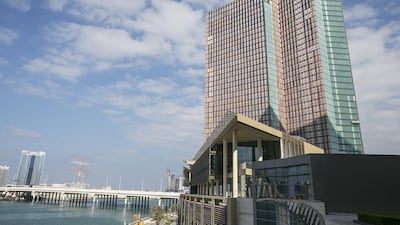Mubadala Development Company swung to a loss of nearly Dh5 billion in the first half of the year, compared to a profit of about Dh500 million in the first half of last year, owing to rising costs, the Abu Dhabi investment company said on Thursday.
Profit for the group – which has large investments in semiconductors, aluminium manufacturing, health care and energy, as well as other investments – was hit by a combination of higher operating costs, lower commodity prices and an impairment charge of about Dh1.5bn for unspecified currency losses across the group.
The Abu Dhabi government-owned strategic investment company, which has announced plans to merge with International Petroleum Investment Company (Ipic), a larger government-owned investment company, said revenue was up about 5 per cent during the period at Dh14.3bn, compared with Dh13.6bn the previous year.
The total comprehensive loss of just under Dh5bn includes fair value charges, such as depreciation against some of the semiconductor factory units it acquired last year when it bought IBM’s micro-electronics business.
Mubadala said the loss attributable to the owner was Dh4.4bn compared to a profit for last year’s first half of Dh625m.
“The global economic challenges we have faced since the beginning of 2015 persist,” said the Mubadala group chief executive Khaldoon Al Mubarak.
Earlier this year, Abu Dhabi’s leadership announced that Mubadala Development will merge with Ipic, which has also experienced a downturn in some of its broad portfolio of investments, most of which are in oil, gas and petrochemicals, including full ownership of Spain’s Cepsa and a major stake in OMV of Austria.
“Combining the two companies will create one of the largest state-owned investment funds globally, which will be dedicated to Abu Dhabi’s economic diversification and have the scale to accelerate new and existing global industrial champions,” said Mr Al Mubarak.
The official resolution to merge the two companies was announced at the end of June and it is expected to be completed by the end of the year or early next year.
One concern of the Abu Dhabi Government has been to reduce the overall debt of its government-related entities (GREs), which among other things has been crowding out financing for non-government businesses during an oil price-related economic slowdown.
The combined debt of Mubadala and Ipic before the merger was about US$40bn, although the total has been shrinking.
Mubadala said it had paid down a net Dh8bn of liabilities in the first half, reducing gearing to 12 per cent from 14 per cent. A spokesman said that came mainly from repayment of a bank loan facility.
The merger is designed in part to give the new larger company more balance sheet heft and flexibility – Ipic’s revenue is about four times that of Mubadala’s, with about three times the debt level.
Mubadala’s $1bn to $2bn annual cash flow has also regularly fallen short of capital investment needs, whereas Ipic’s $3bn to $5bn is more than adequate, so the merger will reduce the need for government or external loans for Mubadala, said Anita Yadav, a debt analyst at Emirates NBD.
“The merged entity is likely to have lower reliance on external funding,” she said, although she thinks the larger company will be more expansionary.
“Abu Dhabi Inc did indicate its preference to de-leverage but that was more than 12 to 18 months ago,” she said.
“Now, in view of low oil revenues, they may not be able to achieve deleveraging. In fact, given that the valuation on energy-related assets has fallen globally, Mubadala/Ipic may actually buy more assets and may actually raise more debt and increase leverage.”
One of the highlights of Mubadala’s first half was increased revenue from the healthcare sector.
The company said its Healthpoint Hospital unit opened a new medical centre for obesity. The Cleveland Clinic Abu Dhabi, which opened last year, completed more than 4,500 surgeries and procedures in the first half.
Cleveland Clinic is on Al Maryah Island in Abu Dhabi, which Mubadala is developing with the US firm Related. The project made progress this year with the opening of the Four Seasons Hotel as well as the completion of two bridges.
business@thenational.ae
Follow The National's Business section on Twitter

